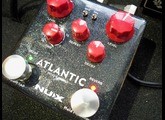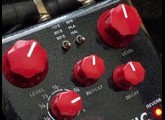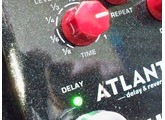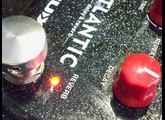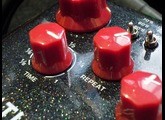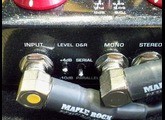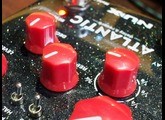« Incredible Clarity of Delay and Reverb »
Published on 04/11/19 at 05:05
Best value:
Excellent
Audience:
Anyone
SOUND:
The Atlantic (either delay or reverb) produces one of the cleanest and clearest effects I’ve heard. That may not sit well for everyone, as some musicians may prefer either delay or reverb to be toned down (a lower tone so that it stays hidden in the background as opposed to popping out as it does).
However, for those who want a bold delay or reverb, and I suspect more so for the ambient player who wants swirling and pulsating effects to have a dominant role in the overall sound, then the Atlantic does not disappoint. With 32-bit quality you can hear the differences among the Analog Delay, Tape Echo and Digital Delay. The same is true with the Spring Reverb, Plate Reverb and Hall Reverb. I say that without hesitation since many ‘space’ pedals do not have the clarity of the Atlantic, and can sound slightly muddy or muffled in comparison (thus making the delay or reverb less obvious, sometimes impossible, to hear the differences among types, e.g., analog vs. tape). The sound quality is an obvious plus for the Atlantic, but also being able to dial into various patterns prior to a Tap Tempo adds a lot to the ambience of the delay, whether you want a full note, ¾, ½, 1/3, ¼, 1/6 or 1/8th. And the Shimmer effect of the Reverb (accessed by holding down the Reverb’s footswitch) is nothing short of awesome when you want to add that extra dimension and sustain to your playing.
OVERALL IMPRESSION:
The Atlantic must be a contender for the best delay-reverb pedal for the money, particularly at only $149 USD. Certainly there are pedals out there that offer more types of delay and reverb, but the quality of the sound coming from the Atlantic is awe-inspiring, particularly when it comes to ambient music or playing with cleaner tones (obviously more distorted tones will cover up the true brilliance and clarity of the Atlantic, but that is the nature of anything higher-gain). The best way to describe this quality is a separation of the effect from the original tone, which may not be to everyone’s liking (perhaps you want a lot of delay or reverb, but have it floating in the background in a more subtle manner… if so, it may be prudent to have an EQ after the Atlantic [then into your effects loop] to keep things darker and less transparent). However, if you enjoy having your delay and/or reverb stand out in the mix, that it is as important or integral a part of your sound as the guitar’s tone itself, then the Atlantic will not disappoint. With three types of delay and three types of reverb that can be mixed in any combination and even routed in different combinations (reverb into delay, delay into reverb, or in parallel), you do get some solid customization. As well, you can run the Atlantic in mono or stereo, hold the reverb footswitch for some added shimmer/sustain, and even add a time measurement (e.g., quarter-notes) to your tap tempo. I have more diverse delay-reverb pedals, but this 32-bit beauty keeps pulling me back in. If I could add two things they would be tone knobs and another switch to select routing options (as is found on NUX’s Cerberus).
GENERAL USE:
Setting up the Atlantic is straight-forward, with the guitar going in and either mono or stereo going out (either a two-cable out or a TRS Y cable out of one output will give you stereo). Delay Time can be controlled with the Time knob – the more you turn it up, the longer the delay, upward of 1500ms. However, you can use the Time knob to add a measure (e.g., eighth-note) and then Tap Tempo your timing. As usual, there also are Level (mix) and Repeat knobs for the delay, while selecting three classic types of delay: Analog, Tape and Digital. The Reverb side operates as usual, with Level and Decay knobs. The added bonus is the Reverb’s footswitch, and when held adds a shimmer effect, although the sound of that shimmer varies depending on which Reverb you choose: Spring, Plate or Hall. The demo video goes through the types of delay, reverb and the shimmer effect. You can engage just the delay or just the reverb via the footswitches, but also route them in different ways: reverb into delay, delay into reverb or in parallel (whereby neither affects the other). When running reverb into delay you can hear the reverb’s decay being echoed back, whereas delay into reverb (the most common setup) has the echo fading into the decay. If running in Parallel, there is a small toggle switch on the back of the Atlantic that needs to be flipped (from its serial position). If you want to run delay into reverb, then you need to set up the pedal in order to do so, viz., hold down the delay’s footswitch when powering up the unit; conversely, hold the reverb’s footswitch when powering up will result in the reverb coming before the delay. Lastly, there is a mini USB port in the back that allows for computer hookup to obtain any firmware updates.
OTHER DETAILS:
Weighing 420g (0.9 pounds) and measuring 10.5 (L) x 11.5 (W) x 5.7 (H) cm (4.13 x 4.52 x 2.24 inches), the Atlantic has a strong, yet lightweight aluminum chassis. It has very attractive and durable black sparkle powder coated paint with white lettering. The delay and reverb footswitches are ‘soft’ switches (no clicking) that are silent when turning on and off. They are somewhat close to the various knobs, but those knobs are of heavy construction and will withstand the odd stomping if a foot happens to over-reach. The pots for the various knobs are of good quality when turned and silent (no scratching or other noises). The two top toggle switches (for delay and reverb selections) are solid with an obvious click when making a selection and are far removed from the footswitches (besides being sandwiched between the two large Level knobs. All connections (input, output, power and USB) are in the back, thus saving pedalboard space and with any cabling being far removed from the footswitches. There are two switches in the back, for Level and when running the Atlantic in Serial or Parallel – both are solid in feel and small enough that they would not catch on anything and become damaged or switched accidentally. The Atlantic does not run on batteries, but requires only a typical 9VDC power supply and while consuming only 6mA.
The Atlantic (either delay or reverb) produces one of the cleanest and clearest effects I’ve heard. That may not sit well for everyone, as some musicians may prefer either delay or reverb to be toned down (a lower tone so that it stays hidden in the background as opposed to popping out as it does).
However, for those who want a bold delay or reverb, and I suspect more so for the ambient player who wants swirling and pulsating effects to have a dominant role in the overall sound, then the Atlantic does not disappoint. With 32-bit quality you can hear the differences among the Analog Delay, Tape Echo and Digital Delay. The same is true with the Spring Reverb, Plate Reverb and Hall Reverb. I say that without hesitation since many ‘space’ pedals do not have the clarity of the Atlantic, and can sound slightly muddy or muffled in comparison (thus making the delay or reverb less obvious, sometimes impossible, to hear the differences among types, e.g., analog vs. tape). The sound quality is an obvious plus for the Atlantic, but also being able to dial into various patterns prior to a Tap Tempo adds a lot to the ambience of the delay, whether you want a full note, ¾, ½, 1/3, ¼, 1/6 or 1/8th. And the Shimmer effect of the Reverb (accessed by holding down the Reverb’s footswitch) is nothing short of awesome when you want to add that extra dimension and sustain to your playing.
OVERALL IMPRESSION:
The Atlantic must be a contender for the best delay-reverb pedal for the money, particularly at only $149 USD. Certainly there are pedals out there that offer more types of delay and reverb, but the quality of the sound coming from the Atlantic is awe-inspiring, particularly when it comes to ambient music or playing with cleaner tones (obviously more distorted tones will cover up the true brilliance and clarity of the Atlantic, but that is the nature of anything higher-gain). The best way to describe this quality is a separation of the effect from the original tone, which may not be to everyone’s liking (perhaps you want a lot of delay or reverb, but have it floating in the background in a more subtle manner… if so, it may be prudent to have an EQ after the Atlantic [then into your effects loop] to keep things darker and less transparent). However, if you enjoy having your delay and/or reverb stand out in the mix, that it is as important or integral a part of your sound as the guitar’s tone itself, then the Atlantic will not disappoint. With three types of delay and three types of reverb that can be mixed in any combination and even routed in different combinations (reverb into delay, delay into reverb, or in parallel), you do get some solid customization. As well, you can run the Atlantic in mono or stereo, hold the reverb footswitch for some added shimmer/sustain, and even add a time measurement (e.g., quarter-notes) to your tap tempo. I have more diverse delay-reverb pedals, but this 32-bit beauty keeps pulling me back in. If I could add two things they would be tone knobs and another switch to select routing options (as is found on NUX’s Cerberus).
GENERAL USE:
Setting up the Atlantic is straight-forward, with the guitar going in and either mono or stereo going out (either a two-cable out or a TRS Y cable out of one output will give you stereo). Delay Time can be controlled with the Time knob – the more you turn it up, the longer the delay, upward of 1500ms. However, you can use the Time knob to add a measure (e.g., eighth-note) and then Tap Tempo your timing. As usual, there also are Level (mix) and Repeat knobs for the delay, while selecting three classic types of delay: Analog, Tape and Digital. The Reverb side operates as usual, with Level and Decay knobs. The added bonus is the Reverb’s footswitch, and when held adds a shimmer effect, although the sound of that shimmer varies depending on which Reverb you choose: Spring, Plate or Hall. The demo video goes through the types of delay, reverb and the shimmer effect. You can engage just the delay or just the reverb via the footswitches, but also route them in different ways: reverb into delay, delay into reverb or in parallel (whereby neither affects the other). When running reverb into delay you can hear the reverb’s decay being echoed back, whereas delay into reverb (the most common setup) has the echo fading into the decay. If running in Parallel, there is a small toggle switch on the back of the Atlantic that needs to be flipped (from its serial position). If you want to run delay into reverb, then you need to set up the pedal in order to do so, viz., hold down the delay’s footswitch when powering up the unit; conversely, hold the reverb’s footswitch when powering up will result in the reverb coming before the delay. Lastly, there is a mini USB port in the back that allows for computer hookup to obtain any firmware updates.
OTHER DETAILS:
Weighing 420g (0.9 pounds) and measuring 10.5 (L) x 11.5 (W) x 5.7 (H) cm (4.13 x 4.52 x 2.24 inches), the Atlantic has a strong, yet lightweight aluminum chassis. It has very attractive and durable black sparkle powder coated paint with white lettering. The delay and reverb footswitches are ‘soft’ switches (no clicking) that are silent when turning on and off. They are somewhat close to the various knobs, but those knobs are of heavy construction and will withstand the odd stomping if a foot happens to over-reach. The pots for the various knobs are of good quality when turned and silent (no scratching or other noises). The two top toggle switches (for delay and reverb selections) are solid with an obvious click when making a selection and are far removed from the footswitches (besides being sandwiched between the two large Level knobs. All connections (input, output, power and USB) are in the back, thus saving pedalboard space and with any cabling being far removed from the footswitches. There are two switches in the back, for Level and when running the Atlantic in Serial or Parallel – both are solid in feel and small enough that they would not catch on anything and become damaged or switched accidentally. The Atlantic does not run on batteries, but requires only a typical 9VDC power supply and while consuming only 6mA.

